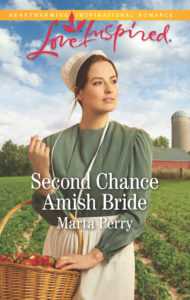 The latest Amish romance from Marta Perry is Second Chance Amish Bride (Love Inspired). Caring for her late cousin’s young kinder is Jessie Miller’s duty—even if it means seeing their father again. In this Q&A, the author shares how she approaches writing about the Amish, and the most challenging part of writing the story…
The latest Amish romance from Marta Perry is Second Chance Amish Bride (Love Inspired). Caring for her late cousin’s young kinder is Jessie Miller’s duty—even if it means seeing their father again. In this Q&A, the author shares how she approaches writing about the Amish, and the most challenging part of writing the story…
What were your goals writing Second Chance Amish Bride?
When I began writing Second Chance Amish Bride, I wanted to tell a story about forgiving, especially about the need to accept God’s forgiveness for past mistakes. Since the Amish take very seriously the duty of forgiving others, I thought it would be touching to explore how an Amish person might deal with the idea of accepting forgiveness for oneself. It seems to me that many of us find it easier to forgive others than to forgive ourselves.
How do you approach writing about the plain people in a way that’s accurate to their way of life?
Because I am of Pennsylvania Dutch descent and grew up knowing a number of Plain people, I feel I have a head start on understanding the plain sects. I’ve always lived in areas where there were either Old Order Mennonites or Amish, so I’ve developed my stories along the lines of the specific groups I know best.
Pennsylvania Amish can be different from Ohio Amish or the Amish in other states, and they can also be different from one group to another, so all of my stories are set in the kind of communities I know best—those that have grown primarily as daughter settlements of the Lancaster County Amish but have developed some customs of their own. When I’m writing in the voice of an Amish person, I try very hard to look at everything in the story world as that person would, not as I would.
What can you tell us about the main characters?
Both Jessie and Caleb in my story are confronted with issues of forgiveness and trust, though in very different ways. In a sense, each of them is the only person who is really fitted to push the other into recognizing and changing the flaw in his or her inner self. To me, that is what makes a strong love story—the sense that this is the one person God created who can bring about the other’s change.
What was the most challenging part of writing the story?
I found it very challenging to find a way to present Caleb’s initial reactions to Jessie in a way that wouldn’t lose the reader’s sympathy for him. I hope I succeeded in showing the reader that although he appears to be angry with and rejecting of Jessie, it’s really himself that he’s blaming. He’s just not ready to accept that until God uses Jessie to show him the truth!
What do you want readers to take away after reading Second Chance Amish Bride?
I hope the readers will take away the recognition that in painful relationships, it’s not only necessary to forgive others but to accept God’s forgiveness for ourselves.


